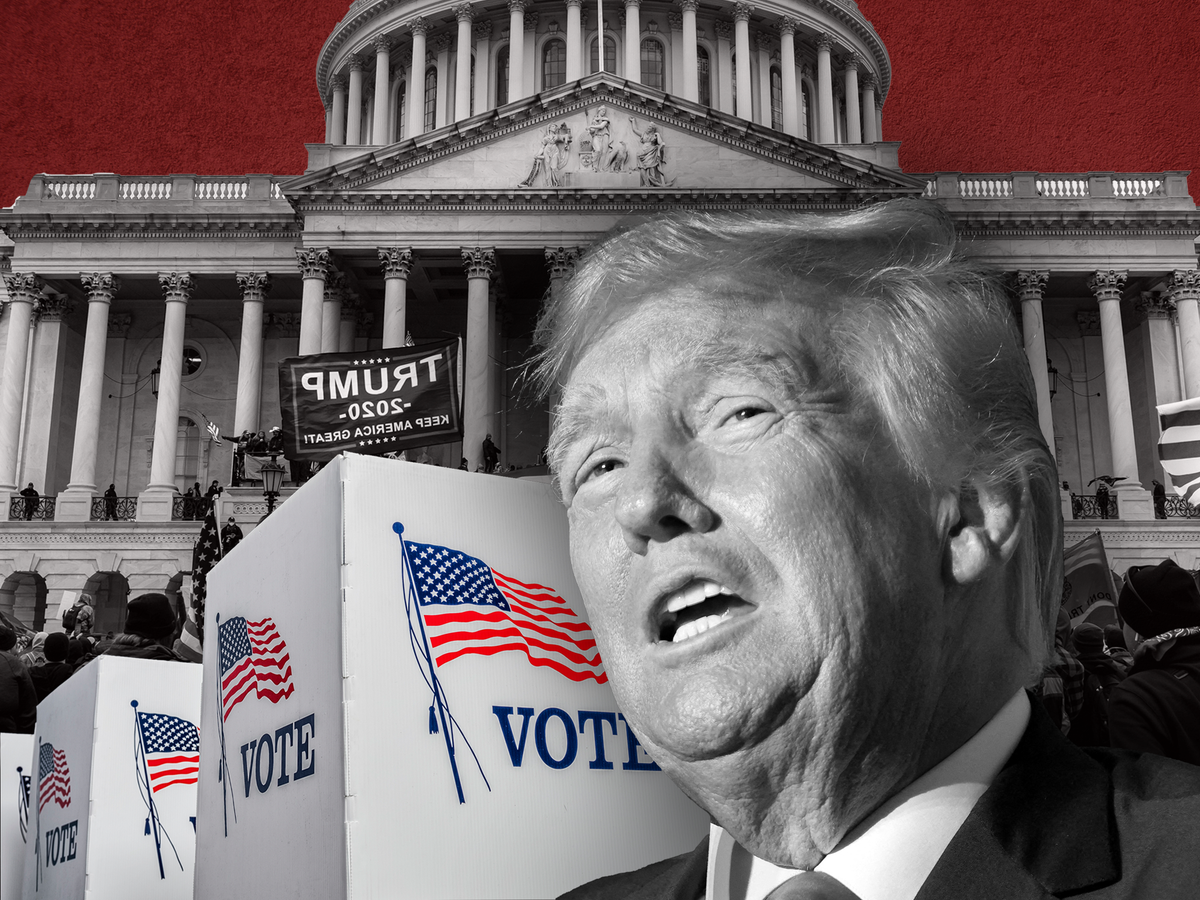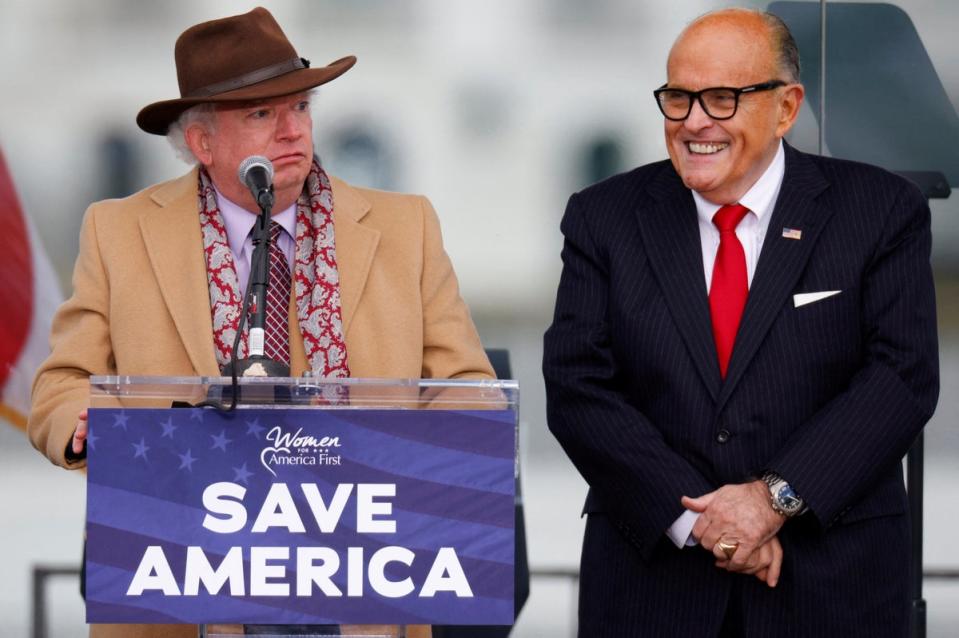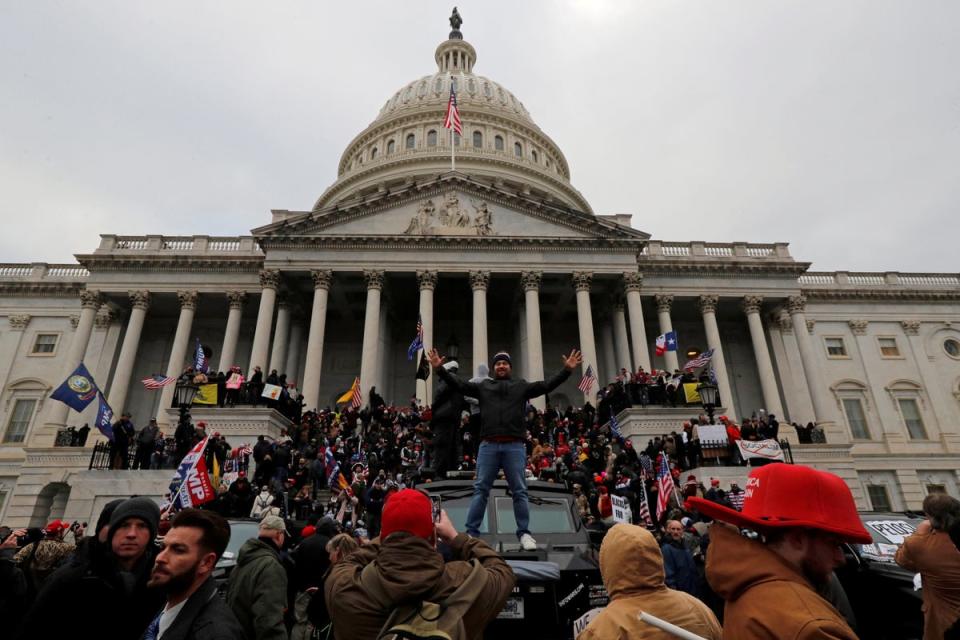Trump, January 6 and a conspiracy to overturn the 2020 election: The federal investigation, explained

- Oops!Something went wrong.Please try again later.
Indictments are imminently expected following a federal investigation into efforts from Donald Trump and his allies to subvert the outcome of the 2020 presidential election.
The former president announced he received a target letter – a document formally indicating he is the subject of an investigation and – in connection with a sprawling US Department of Justice special counsel probe into an alleged scheme to preserve Mr Trump’s presidency against the wills of millions of voters.
A case will not likely be revealed in full until an indictment is unsealed in US District Court, but a wealth of evidence uncovered by members of Congress and in other documents suggests that the former president and potential co-defendants could be prosecuted in what would be a second round of federal charges against him.
A House select committee spent a year and a half investigating the events surrounding and leading up to the attack on the US Capitol on 6 January, 2021, including a series of blockbuster public hearings laying out evidence and witness testimony describing the depth of Mr Trump’s attempts to remain in office at whatever cost.
The panel’s final 845-page report provides a detailed account of Mr Trump’s refusal to cede power – regardless of the outcome of a democratic election – while privately acknowledging that he lost, as his baseless “stolen election” narrative fuelled his supporters to riot in the halls of Congress, an argument that also bolstered his second impeachment in the House of Representatives.
In December, lawmakers on the House committee unanimously voted to recommend charges against the former president, claiming that there is enough evidence to prosecute him for at least four crimes – including aiding or providing comfort to an insurrection aimed at toppling the United States government.
The panel also referred Mr Trump to the Justice Department for the obstruction of an official proceeding, conspiracy to defraud the US, and conspiracy to make a false statement to the federal government.
John Eastman, the attorney who argued that Mr Pence could reject election results, and Kenneth Chesebro, who helped develop the fake elector scheme, were also implicated in the committee’s report, along with former White House chief of staff Mark Meadows, attorney Rudy Giuliani, and former assistant US Attorney General Jeffrey Clark.
It was a mostly symbolic vote, marking the culmination of the committee’s months-long investigation, but it sent a powerful signal from a bipartisan group of lawmakers bolstered by mountains of evidence that a former president should be held accountable for his alleged crimes against the government.
That report and countless investigations into the events surrounding January 6 have painted the attack on the Capitol as part of a much-larger effort to preserve a fragile American democracy in a volatile battle to determine the truth and who wields it.
Who is under investigation?
The Justice Department, meanwhile, had separately been investigating Mr Trump’s rejection of 2020 results, building on the years of work from federal prosecutors to investigate more than 1,000 people in connection with the January 6 attack on the US Capitol, fuelled by the former president’s ongoing false claims that the election was rigged against him.
Prosecutors have talked to a number of chief aides and officials in Mr Trump’s circle, including Mr Pence, White House chief of staff Mark Meadows, former attorney Rudy Giuliani, former White House counsel Pat Cipollone, his former deputy Pat Philbin, and former National Security Adviser Robert O’Brien, among several others.
They also have spoken with Georgia Secretary of State Brad Raffensperger, who was on the other end of a call with Mr Trump demanding that the state’s top elections official “find 11,780 votes” – enough for him to overturn Mr Biden’s victory in the state.
That call, which was taped, also is at the centre of a separate investigation from Fulton County District Attorney Fani Willis into election interference in the state.

Arizona – ground zero for an election denialism movement that gave rise to leading GOP candidates for the top three statewide offices, including failed candidate for governor Kari Lake – was a focal point for the Trump campaign and his allies, who filed several lawsuits against the state and some counties in an attempt to overturn the lawful results. Mr Biden won the state by roughly 10,000 votes.
Federal prosecutors have talked to former Arizona Governor Doug Ducey, who silenced a call from Mr Trump while Mr Ducey was in the middle of certifying his state’s election results – a process that was being live-streamed and carried across news outlets.
Mr Smith’s office also subpoenaed the office of Arizona Secretary of State and has met with top elections officials in Wisconsin, New Mexico and Pennsylvania.
Prosecutors also have interviewed Michigan Secretary of State Jocelyn Benson, whose office provided a tranche of documents that included communications between the state’s election officials and Mr Trump’s former lawyers and members of his campaign as the former president’s allies targeted the critical battleground state.
Central to the investigation is whether Mr Trump knew that he lost but pressed ahead with spurious efforts to overturn results anyway, with federal prosecutors reportedly speaking to his son-in-law and former adviser Jared Kushner and former communications directors Hope Hicks and Alyssa Farah Griffin with those questions in mind.
What charges could prosecutors bring against Trump?
Based on evidence uncovered by the select committee and other filings and reporting, prosecutors are likely investigating several key elements of the sprawling effort to reverse the 2020 election: Mr Trump’s lies about the outcome, his campaign’s attempts to pressure state officials and push false slates of electors to obstruct the certification of the results, a failed attempt to persuade Mr Pence to refuse the outcome, and Mr Trump’s failure to stop a mob of his supporters from breaking into the Capitol.

Mr Trump knew he had lost the election but continued to pursue efforts to remain in power, including the so-called alternate elector scheme to fraudulently certify the results submitted to Congress, prosecutors are likely to argue.
On 18 July, Michigan attorney general Dana Nessel charged 16 “fake” electors in that state, marking the first criminal charges brought against so-called “alternate” electors who sought to overturn 2020 results.
Charges against Mr Trump and others connected to those allegations and similar attempts in other states could include conspiracy to defraud the United States in the administration of elections, the obstruction of an official proceeding, and wire and mail fraud.
Obstruction
The target letter from federal prosecutors to Mr Trump cites three statutes that the former president likely violated in his attempts to reverse the outcome of the 2020 election.
One charge – obstruction of an official proceeding – has already been brought against hundreds of people in connection with the Capitol attack.
The House select committee and a federal judge who was involved in cases stemming from its inquiry argued that there is evidence that Mr Trump sought to corruptly obstruct the certification of electoral college votes in Congress – a crime punishable up to 20 years in prison, if convicted.
Conspiracy
That same federal judge and the House select committee also have argued that there is evidence to convict Mr Trump on a charge of conspiracy to defraud the government, which is punishable by up to five years in prison.
Mr Trump’s efforts through his legal team and his inner circle to block the certification of Mr Biden’svictory in states that he lost, while falsely claiming widespread voter fraud and manipulation had stolen the election from him, would likely form the basis for that charge.
The former president also is charged under this statute in the Mar-a-Lago documents case, where he is accused of using a lawyer to lie to the Justice Department.
“The illegality of the plan was obvious,” California Judge David O Carer wrote in a ruling from a civil lawsuit involving John Eastman, who was central to the so-called “alternate” electors scheme.
Mr Trump, ignoring the nation’s history of the peaceful transition of power, “vigorously campaigned for the vice president to single-handedly determine the results of the 2020 election,” the judge wrote.
Fraud
The special counsel investigation suggests that prosecutors are scrutinizing Mr Trump’s vast fundraising arm and the tens of millions of dollars it raised after pleas to supporters for donations to combat election fraud, despite no evidence to defend those claims.
In May 2020, with the presidential election still months away, Mr Trump said it would be “rigged” against him if he were to lose. That June, he said the election would be the “scandal of our times”, called it “inaccurate and fraudulent” and the “greatest election disaster in history”. Not a single ballot had yet been cast.
His own Justice Department and campaign found no evidence of widespread voter fraud, and dozens of lawsuits filed by his campaign and allies to overturn results were withdrawn or dismissed, while his attorneys and the right-wing network amplifying their false claims face massive defamation lawsuits from the voting machines companies and election workers at the center of them.
Lawmakers on the House select committee argued that Mr Trump’s campaign “misled donors as to where their funds would go and what they would be used for,” US Rep Zoe Lofgren said during hearings.
“So not only was there the ‘Big Lie,’” she said. “There was the ‘Big Rip-off.’”
Is there a case for insurrection?
After Mr Pence refused Mr Trump’s argument for his vice president to toss out the results, then-President Trump “went to his last resort: triggering an insurrection in the hope that it would throw Congress off course, delaying the transfer of power for the first time in American history,” according to legal experts at Just Security, outlining a model prosecution memorandum similar to what federal prosecutors would also likely be reviewing.
And after delivering remarks to a rally of his supporters while a joint session of Congress convened to certify 2020 election results, a speech that allegedly incited his supporters to storm the Capitol, then-President Trump stood by for 187 minutes before he told them to go home.
The House select committee unanimously agreed that Mr Trump should be charged for inciting an insurrection and giving aid or comfort to insurrectionists – a rare and severe charge that prosecutors will approach only with extreme caution, if they decide to prosecute at all.
“We believe there is sufficient evidence to pursue it – as did the Select Committee in making a criminal referral of Trump under that statute – but prosecutors may make different choices,” experts at Just Security noted.
A conviction on that charge mandates a sentence of up to 10 years in prison and would prohibit Mr Trump from holding office.
None of the more than 1,000 people arrested in connection with the attack are facing this charge.

